Alpine Summer School in Cultural Anthropology
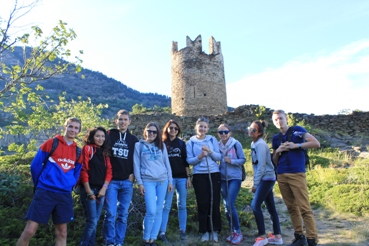
The valley of Aosta has got a rich historical heritage; there are many monuments of the ancient Roman architecture present here (Aosta once was an important strategic point on the road from Italy to Central Europe). Also, there is the largest number of medieval castles in the valley of Aosta. Residents of Valle d’Aosta appreciate and respect their history and thanks to this, most castles have been well preserved to this day. Many of them are currently functioning as museums and there are those used as residences and hotels. During the excursions not only did we explore the valley but also visited some neighbouring regions of Italy and other countries.
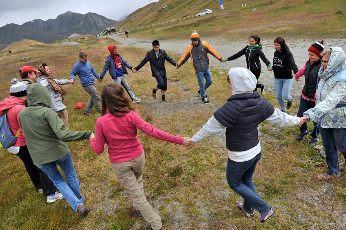 One of the most memorable events was a trip to Switzerland across the Pass of Grand Saint-Bernard, 2469 meters above sea level (!). During this excursion, we visited an exhibition of works by Renoir, collected from well-known museums and art galleries across the world, at the Museum of Pierre Gianadda Foundation in the city of Martigny. The trekking across the valley left a lasting impression – when being exhausted and climbing a steep mountain, not able to see anything in front of you except trees and your equally ‘suffering’ buddy’s feet, suddenly, at the next bend in the path, you enter a clearing where ruins of a medieval castle appear before you, on the very top of the mountain, offering a great view of the surrounding mountains!.. It was, indeed, well worth the effort!
One of the most memorable events was a trip to Switzerland across the Pass of Grand Saint-Bernard, 2469 meters above sea level (!). During this excursion, we visited an exhibition of works by Renoir, collected from well-known museums and art galleries across the world, at the Museum of Pierre Gianadda Foundation in the city of Martigny. The trekking across the valley left a lasting impression – when being exhausted and climbing a steep mountain, not able to see anything in front of you except trees and your equally ‘suffering’ buddy’s feet, suddenly, at the next bend in the path, you enter a clearing where ruins of a medieval castle appear before you, on the very top of the mountain, offering a great view of the surrounding mountains!.. It was, indeed, well worth the effort!
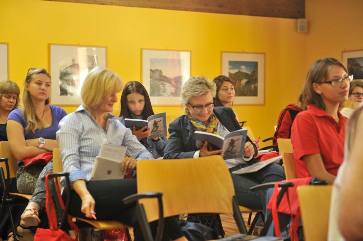 Interestingly, nearly every excursion included a lecture by one of the school teaching staff members. In fact, conventional lectures, with students sitting at the desk and eagerly taking notes, were few. We were mostly taught during joint trips and hiking, during lunch and dinner. There were a lot of not only ‘open air lectures’ but also of joint activities directly involving students, for example, Svetlana Ryzhakova taught us Indian dance at the cromlech at the Petit Saint-Bernard Pass, and Valentina Kharitonova showed us how to behave when visiting a shamanic sanctuary. The lectures given were interesting and useful: Dmitry A. Funk shared some secrets of doing fieldwork, speaking of what should be avoided and what one should aspire in the field; Elena V. Miskova presented the issue of studying collective and individual memory; Lyudmila G. Zhukova told about her research into the Judaizers in Russia; Mikhail Nemtsev elaborated on what philosophical anthropology is about.
Interestingly, nearly every excursion included a lecture by one of the school teaching staff members. In fact, conventional lectures, with students sitting at the desk and eagerly taking notes, were few. We were mostly taught during joint trips and hiking, during lunch and dinner. There were a lot of not only ‘open air lectures’ but also of joint activities directly involving students, for example, Svetlana Ryzhakova taught us Indian dance at the cromlech at the Petit Saint-Bernard Pass, and Valentina Kharitonova showed us how to behave when visiting a shamanic sanctuary. The lectures given were interesting and useful: Dmitry A. Funk shared some secrets of doing fieldwork, speaking of what should be avoided and what one should aspire in the field; Elena V. Miskova presented the issue of studying collective and individual memory; Lyudmila G. Zhukova told about her research into the Judaizers in Russia; Mikhail Nemtsev elaborated on what philosophical anthropology is about.
On the whole, the motto of the summer school was ‘The field is all around us!’ We were staying in the same house with our educators and could discuss all the questions of interest with them informally. Such events really help young researchers learn from senior fellow researchers.
What is worth a special mention is the organization of the school which was beyond all praise. Konstantin Bannikov, who masterminded and organized the school, thought through every detail and found Italian partners represented by Anna Soden from the Ministry of Tourism in Valle d’Aosta. Anna Soden, who knows Russian very well and has repeatedly been to Russia, accompanied us during nearly all of the excursions talking about the everyday life of Valle d’Aosta residents and held master classes in making pasta and polenta (a local traditional cornmeal dish). On the return from the trip to Aosta during the first day of our stay in Italy, we were invited to a welcome reception by the Ministry of Tourism, with a welcome speech delivered by the Valle d’Aosta minister of tourism. The support from the Ministry helped us visit those places usually not accessible for ordinary visitors. And we thank the partners for that!
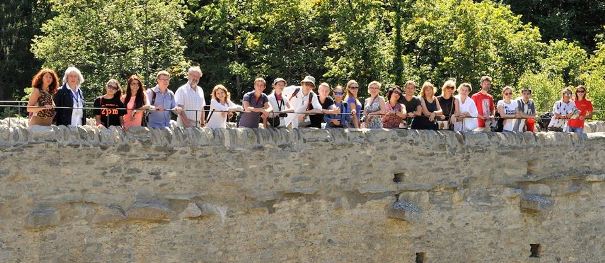 |
So, we can speak about the school for hours and will remember it for a long-long time. To each and every one of the participants it was different but, undoubtedly, the school has changed us all and gave impetus for further professional and personal development.
P.S. Our special thanks go to the Heads of the Laboratory for Social and Anthropological Research for providing the opportunity to participate in the school!
Some notes by school participants:
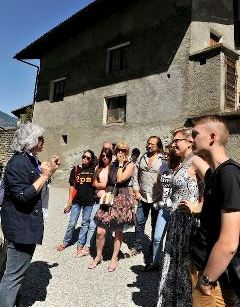 ‘The cities we visited left a lot of memories. Turin, Milan, and the Swiss city of Montreux. Beautiful people of different races, ethnicities and beliefs live in these cities. One can see the Chinese purchasing branded goods in stores of Milan, the Gypsies begging in the streets of Turin, the Arabs walking along the shores of Lake Geneva, the Turks selling shawarma in snack bars of Montreux. A kaleidoscope of cultures, religions, and nations’.
‘The cities we visited left a lot of memories. Turin, Milan, and the Swiss city of Montreux. Beautiful people of different races, ethnicities and beliefs live in these cities. One can see the Chinese purchasing branded goods in stores of Milan, the Gypsies begging in the streets of Turin, the Arabs walking along the shores of Lake Geneva, the Turks selling shawarma in snack bars of Montreux. A kaleidoscope of cultures, religions, and nations’.
‘I did like the city centre of Aosta very much, walking along its streets in free time and simply sitting around watching the locals. They are so joyful and satisfied with life that you yourself get positively recharged'.
‘The steady life of Aosta residents is absolutely subject to the rhythm and the laws of nature. The atmosphere of the valley, where men and nature harmonically coexist, made us think about many things – about the violent ethnic history of the place, the regional identity of Valle d’Aosta, and about the reasons behind the local separatism which manifested itself in conversations with the locals who spoke about their relations with residents of the neighbouring regions of Piemont and Lumbardia’.
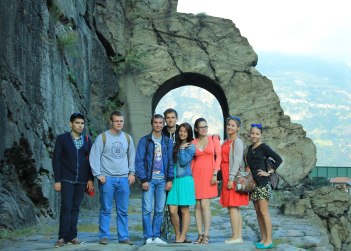 ‘The special atmosphere, permeating our stay in Aosta, got us tuned in to the anthropological wave and made us think differently, paying attention to details which, as it could seem, have no importance whatsoever. What to say.. you really start to think differently! It couldn’t be otherwise when all the conversations were about anthropological research, fieldwork, papers, books, etc. Here, you could simply talk with the professors, away from the rush of the university life, over dinner or while on the way somewhere’.
‘The special atmosphere, permeating our stay in Aosta, got us tuned in to the anthropological wave and made us think differently, paying attention to details which, as it could seem, have no importance whatsoever. What to say.. you really start to think differently! It couldn’t be otherwise when all the conversations were about anthropological research, fieldwork, papers, books, etc. Here, you could simply talk with the professors, away from the rush of the university life, over dinner or while on the way somewhere’.
‘The Alps – what can be better? I had seen such a beauty in pictures only and couldn’t have thought about seeing it in reality. The views are breathtaking there – the snowy tops of mountains and green meadows, the clear turquoise rivers and waterfalls’.





 The project "Man in a Changing World. Identity and Social Adaptation: Past and Present" is funded by the Russian Government
The project "Man in a Changing World. Identity and Social Adaptation: Past and Present" is funded by the Russian Government 